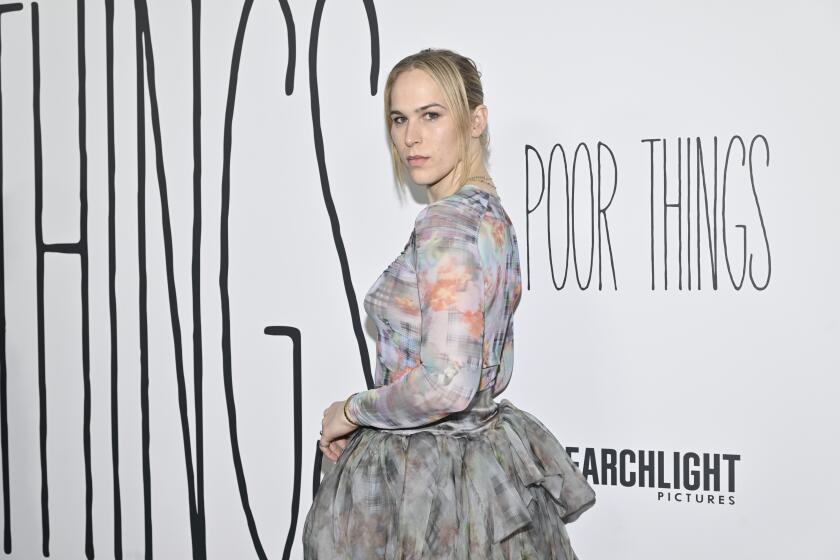Downturn Is Pushing Prop Houses Out of ‘Loop’
For many Hollywood production companies, the stuff that dreams are made of can be found in large, unassuming warehouses--about 28 of them--concentrated in “the Loop” in the eastern San Fernando Valley.
The vast spaces are filled with nearly every imaginable accessory for movie makers: high-end space suits, World War I army boots, vintage ball gowns, Art Deco lamps, disco balls, copies of the Saturday Evening Post.
But staying in business is becoming increasingly difficult for the Loop’s low-margin prop and costume houses squeezed by an unforgiving economy, a recent commercial actors strike, rising costs of rent, energy and workers’ compensation insurance, and the exodus of productions to Australia and Canada.
Half a dozen such companies have closed their doors in the last six months.
In April, after 15 years of providing costumes for such films and TV shows as “Dr. Seuss’ How the Grinch Stole Christmas,” “Boogie Nights,” “JFK” and “Party of Five,” the Costume Collection in North Hollywood began selling off its inventory of 100,000 garments.
That followed the demise a month earlier of Wilcox Props, which liquidated a 32-year-old collection of antiques and period pieces from a warehouse across the street.
Pamela and Jim Elyea, owners of the History for Hire prop house, have been watching the developments at neighboring businesses with trepidation and sadness.
“It’s taking a big toll,” Pam Elyea said. “This isn’t a wealth-building business to begin with. And this time around, the tough times are causing people to reconsider their future in this business.”
In the last eight months, Remarketing Associates Inc., a Woodland Hills firm that sells off the assets of financially troubled businesses, has liquidated the merchandise of six Hollywood rental services firms. Previously, it dealt primarily with technology firms.
“When these rental companies calculate their profitability, they factor in the space that an item occupies and how often it will be rented,” Remarketing owner Jeffrey J. Tannenbaum said. “With increased facilities costs, they have to get their items rented more often or they will feel the impact on their business.”
The same rental businesses that benefited from a boom in entertainment production in the mid-1990s are feeling the effects of a slowing economy, said Cody Cluff, who heads the Entertainment Industry Development Corp.
The number of days that film and TV production companies shot in Los Angeles County doubled from about 25,000 to just under 50,000 between 1994 and 1997, according to the corporation, which issues permits to shoot in Los Angeles.
Similarly, the number of smaller support businesses that typically employ up to 15 people rose significantly during that period, Cluff said.
Lured by Low Rents
Many of the prop houses were drawn to the Loop--an industrial area bounded by California 134 and the Hollywood and Golden State freeways--by its proximity to the studios and relatively low rents, which over the last six years have increased from 30 to 40 cents a square foot to about 55 cents, according to the vendors.
“The Loop has been a low-cost area [in which] to locate and the businesses there operate on narrow margins,” Cluff said. “The people who are going to survive are the ones with lower overheads and the capital.”
Jean Rosone, who is trying to stave off bankruptcy by selling her inventory at Costume Collection, started the company in 1985 by renting clothes from a few costume designers to entertainment productions. It quickly grew into a thriving consignment costume rental business, supplying TV networks and major studios.
Like many others, Rosone rode Hollywood’s expansion wave through much of the 1990s.
Later in the decade, runaway production and a move by studios to spend more money on their own costume departments chipped away at small, independent companies, Rosone said. Despite those problems, she was able to move to a larger building several years ago. Then came the sharp economic downturn that began last year.
“There’s a lot more people in this position than are willing to admit it,” Rosone said. “I’m one of the first to go through this process, but I won’t be the last.”
Next door, the Elyeas also are feeling the pinch.
They started History for Hire in their Hollywood apartment in 1985, providing hand grenades, flak vests and machetes for the Academy Award-winning movie “Platoon.” The company grew in spurts, and in 1994 moved to a 33,000 square-foot warehouse in North Hollywood.
In the last year the annual rent rose 25% to $250,000. That does not include rising electricity rates, salaries, insurance fees, maintenance costs and prices of stock items, such as fake corpses and guitars used in music videos and that have graced the cover of Rolling Stone.
The Loop’s prop house owners always have had a sense of camaraderie, often trading items and referring clients to one another, Elyea said. In the last year, they have banded closer together, forming support groups, targeting new markets for their rentals and doing something rare in the business world--divulging closely held financial information to help each other cut costs.
More to Read
The biggest entertainment stories
Get our big stories about Hollywood, film, television, music, arts, culture and more right in your inbox as soon as they publish.
You may occasionally receive promotional content from the Los Angeles Times.






